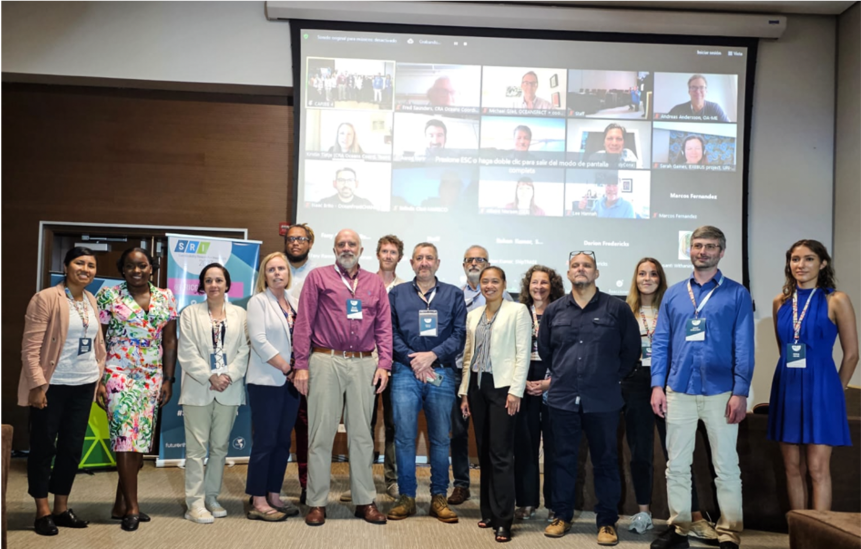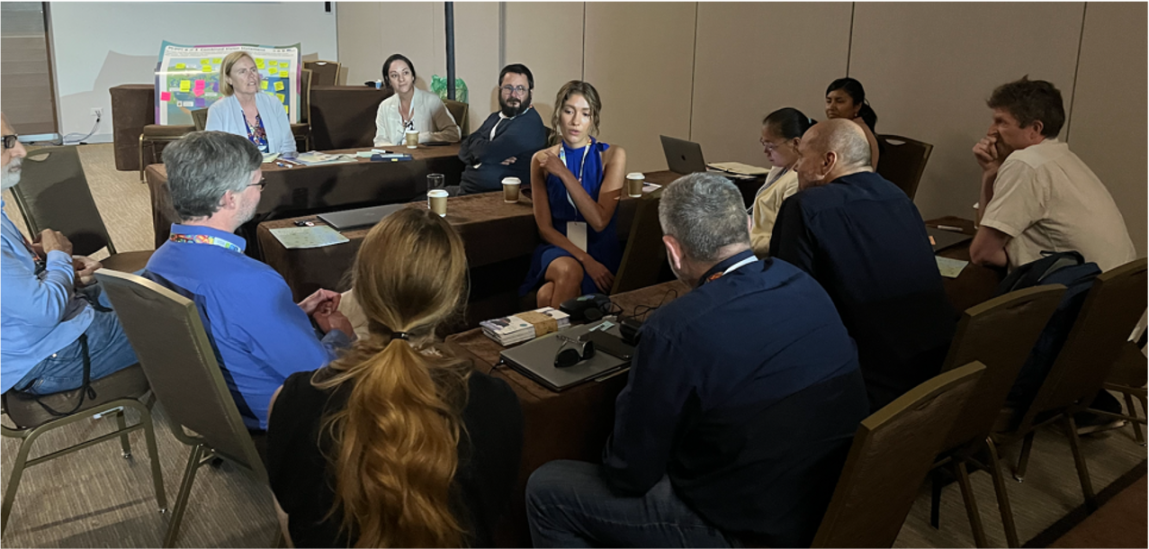Belmont Forum Ocean Sustainability midterm meeting
Bill Dennison ·We held our midterm meeting for the Ocean Sustainability program, funded by the Belmont Forum. The meeting was held on the Open Day of the Sustainability Research & Innovation 2023 conference in Panama and was a hybrid event. There are 13 projects in the Ocean Sustainability program, and each project provided a brief overview of their progress.
- ARMS Restore: This team is investigating the utility of artificial reefs in Southwest Madagascar—the basic question is whether or not artificial reefs enhance fish populations or serve to aggregate existing fish populations. They are deploying artificial reefs built with limestone and epoxy next to existing reefs, and then moving them into non reef areas.
- Oceans PACT: This project is focused on conflicts over the use of marine resources. They recognize that conflict is not always bad—conflicts can be ‘windows for change’. They have case studies in South Africa, the Arabian Sea, Brazil, the Barents Sea, and the Atlantic coast of the United States.
- ShipTRASE: The goal of this project is to reduce emissions from global shipping. Emissions from burning diesel fuel include sulfur compounds and carbon dioxide. This team is conducting environmental, legal, and economic assessments. They are investigating a diversity of potential new fuel sources including hydrogen, ammonia, liquid natural gas, and methanol.
- EXEBUS: This project is focusing on the impact of extreme events on the major upwelling system of the Benguela current off the Atlantic Ocean coast of Africa. The South Africa team described extreme waves, extreme winds, and marine heat waves.
- MARISCO: This project is focused on marine biodiversity. They are investigating biodiversity assessments using multiple metrics. They are focused on two regions where they have social and natural science data available. They are combining the Ocean Health Index and the Cumulative Impact Mapping tools.
- NO CRISIS: Thai project is about negotiating ocean conflicts, and they are examining the origins and rivers of conflict to find options for conflict mitigation. They have case studies in Fiji, Bangladesh, Hawai’i, North Atlantic, Seychelles, El Hierro Island, and North Brazil.
- Multi FRAME: This project is investigating the intention of joint use of marine resources. Case studies include the development of offshore wind farms, marine tourism, aquaculture, fisheries, and conservation areas. They have developed a ten-step process to assess if multiple uses are appropriate, focusing on building trusted relationships.
- COAST Card: This is the project that Vanessa Vargas-Nguyen and I are running to develop socio-environmental report cards, system dynamics models, and social network analysis in Chesapeake, Manila, and Tokyo Bays, the Goa coast of India and Ishigaki Island/Sekisei Lagoon.
- OceanFrontCHANGE: This project is about managing oceanfront ecosystems for climate change in the Mozambique Channel. The team explained the way ocean fronts, vertical walls of water separating different ocean masses, attract fish, including whale sharks.
- Salt-Mine: This project is focused on mineral extraction from seawater. The search for precious metals like Lithium has led the team to investigate the potential to develop desalinization using solar greenhouses by manipulating temperature and pH. They have developed desalinization techniques to generate water that can be used for agriculture.
- COAST: This project is focused on the impacts of changing climate on coastal areas. The team has study sites in the Kara Sea, Gulf of Lyon, Black Sea, Red Sea, and the South American coast of Uruguay and the Parana region.
- POLYCONE: This project is focused on cone snails, as the over 900 species contain conotoxins which have significant pharmaceutical potential. The research is based in French Polynesia and trying to develop a cone snail venom bank with sustainable use.
- OA-ME: This project is focused on evaluating mitigation approaches for ocean acidification. The team is looking for active interventions to protect coral reefs. For example, they are cultivating brown algae that can create favorable seawater chemistry for coral calcification.
We also heard from Fred Saunders who talked about exploring societal impacts that result from our Ocean Sustainability projects. Fred observed that the principal investigators were humble and reflexive, and receptive to working with different types of knowledge and experiences.

Fred asked me to reflect on the impacts of our COAST Card project. I highlighted three levels of stakeholder engagement and introduced the distinction between outreach, collaboration, and co-production. By distinguishing stakeholders into ‘rights-holders’ and ‘duty-bearers’, I advocated that our Ocean Sustainability project teams were acting as facilitators or change agents to connect the rights-holders and duty-bearers. The example I provided for science communication to improve effective outreach was the development of conceptual diagrams for our study sites. These oblique aerial diagrams highlight key features and major threats to aid in developing an environmental literacy for each region. The example that I provided for collaboration for better stakeholder engagement was the development of stakeholder listening sessions. These listening sessions, held in public locations, actively solicit input from a broad swath of people. The example that I provided for agile leadership to enhance co-production was follow-up activities following Chesapeake Bay report card releases. U.S. Senators, Maryland Governors, and various departmental secretaries request briefings to strategize how to improve report card scores.
Alison Clausen also joined us to introduce the UNESCO Ocean Decade 2021-2030. In short, the vision is to provide the science we need for the ocean we want. UNESCO offers endorsements to ocean projects that lead to sustainability. We then had a group discussion about the future of ocean sustainability. We had a broad consensus that another Belmont Forum opportunity to focus on ocean sustainability is urgently needed and consistent with the Ocean Decade. We also talked about building capacity, creating more educational opportunities, and overcoming institutional and governance challenges with an imperative to develop better global ocean literacy in the next Belmont Forum initiative on oceans.

At this juncture in the Ocean Sustainability initiative, I was pleased to see the consensus that these transnational and transdisciplinary teams were able to develop. Once again, I was struck by the collective geographic scope of the various projects, the diversity of topics, and the team compositions that included natural and social scientists and various stakeholders. It is inspiring to be part of such an interesting, impactful, and exciting initiative.
About the author
Bill Dennison

Dr. Bill Dennison is a Professor of Marine Science and Interim President at the University of Maryland Center for Environmental Science (UMCES).
Next Post > A nautical listening session to kick off the summer
Comments
-
Atika 6 months ago
Thank you for sharing this great information with us, i really appreciate your post!